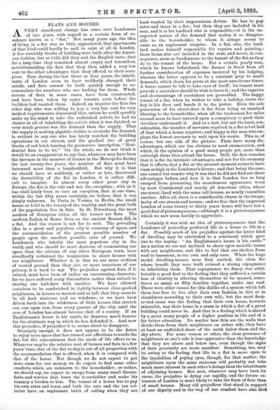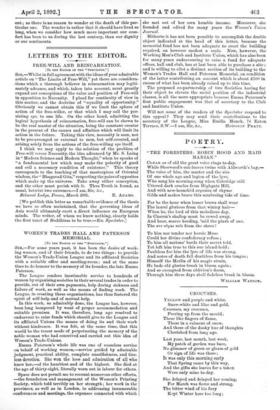FLATS AND HOUSES.
AVERY significant change has come over Londoners of late years, with regard to a certain form of re- sidence known as a "flat." Not many years ago, the idea of living in a flat was so little appreciated, that apartments of that kind could hardly be said to exist at all in London. A few unwieldy blocks of building were built after the Ameri- can fashion, but so little did they suit the English taste, that for a long time they remained almost empty and tenantless, notwithstanding the fact that they then added a very low rent to the other advantages that they offered to their occu- piers. Now, during the last three or four years, the inhabi- tants of London seem to have suddenly changed their minds, and flats cannot be built quickly enough to ac- commodate the numbers who are looking for them. Whole streets of fiats, in some cases, have been constructed, and have been taken by eager tenants even before the builders had vacated them. Indeed, an inquirer for flats the other day, who was willing to pay a very fair rent for very modest requirements, discovered that, unless he could speedily make up his mind to take the unfinished article, he had no chance at all of inhabiting the article when it was finished, so very much greater was the demand than the supply. That the supply is making gigantic strides to overtake the demand, is evident to any one who has lately watched the building operations in our streets, and the gradual rise of great blocks of red brick bearing the premature inscription, "Resi- dential flats to be let." On the whole, we do not think it would be an exaggeration to say that, whatever may have been the increase in the number of houses in the Metropolis during the last twenty-five years, the number of flats must have increased more than a hundredfold. But why it is that we should have so suddenly, or rather so late, discovered the desirability of the flat in London, it is rather diffi- cult to imagine. In almost every other great city in Europe, the flat is the rule and not the exception ; with us it has until lately been so rare an exception, that at one time, within the last fifty years certainly, we believe that it was simply unknown. In Paris, in Vienna, in Berlin, the small house or hael is the luxury of the wealthy, and the great bulk of the population live in flats. In St. Petersburg, the most modern of European cities, all the houses are fiats. The modern Italian in Rome lives, as the ancient Roman did, in a flat. And the reason is not far to seek. The prevailing idea in a great and populous city is economy of space, and the accommodation of the greatest possible number of people upon the smallest possible area of ground. We Londoners, who inhabit the most populous city in the world, and who should be more desirous of economising our space than the citizens of any other European town, have steadfastly withstood the temptation to share houses with our neighbours. Whether it is that we are more reckless of wasted ground than they are, or more tenacious of our privacy, it is hard to say. The prejudice against flats, if it existed, must have been of rather an unreasoning character, for we have suffered many discomforts rather than submit to sharing our hall-door with another. We have allowed ourselves to be sandwiched in tightly between close-packed neighbours, in houses so narrow and so tall, that they seem to be all dark staircase and no windows ; or we have been driven forth into the wilderness of little houses that stretch out, row upon row, from every quarter of the city, until the area of London has almost become that of a county. If an Englishman's house is his castle, he deserves much honour for the obstinate way in which he has defended it. And now this prejudice, if prejudice it is, seems about to disappear.
Strangely enough, it does not appear to be the desire to enjoy more space that has turned our affections towards the flat, but the conveniences that the mode of life offers to us. Whatever may be the relative rent of houses and flats in a few years' time, that of the flat to-day is out of all proportion with the accommodation that is offered, when it is compared with that of the house. But though we do not expect to get more room for our money, we do expect to find some other comforts which are unknown to the householder; or rather, we should say, we expect to escape from many small discom- forts and worries that beset the householder and make his tenancy a harden to him. The tenant of a house has to pay his own rates and taxes, and both the rate and the tax col- lector have an unpleasant habit of calling when they are
least wanted by their impecunious debtor. He has to pay rates and taxes in a fiat; but then they are included in his rent, and it is his landlord who is responsible,—it is the un- expected nature of the demand that makes it so disagree- able to the householder, to whom it always seems to come as an unpleasant surprise. In a flat, also, the land- lord makes himself responsible for repairs and painting these items also are included in the rent, and never, in con- sequence, seem so burdensome to the tenant of the flat as they do to the tenant of the house. For a certain yearly sum,. which he knows beforehand, the former is freed from all further consideration of expenses incurred by his lodging, whereas the latter appears to be a constant prey to small demands, which drain his purse at the most unwelcome times._ A house cannot be left to take care of itself ; its tenant must provide a caretaker should he wish to leave it ; and the vagaries and shortcomings of caretakers are proverbial. The happy tenant of a flat, when he wishes to take a holiday, turns the. key in his door and hands it to the porter. Even the sole possession of his street-door is far from being an unmixed blessing to the householder, when all the tradesmen for miles around seem to have entered upon a conspiracy to push their circulars underneath it. And as a last, but not the least, con- sideration, the number of servants required in a flat is but half of that which a house requires; and happy is the man who em- ploys the fewest servants to wait upon his wants. This is, of course, but one side of the picture. Flats have many dis- advantages, which are too obvious to need enumeration, and which, in the opinion of a good many people yet, more than outweigh those that attend the house. Still, the fact remains- that it is for its intrinsic advantages, and not for the economy that it effects, that a flat at the present moment seems to have risen so high in the Londoner's favour ; and that being the case,. one cannot but wonder why it was that he did not find out those- advantages before, and how it is that London has so long escaped from presenting the monotonous appearance worn by most Continental and nearly all American cities, where one street, lined with the same tall houses, so nearly resembles. another. After all, there is a considerable charm in the irregu- larity of our streets and houses ; and we fear that the improved London of some twenty or thirty years hence will have lost a good deal of picturesqueness,—although it is a picturesqueness which we now seem hardly to appreciate.
Certainly it was with no idea of picturesqueness that the- Londoner of yesterday preferred life in a house to life in a flat. Possibly much of his prejudice against the latter kind of dwelling may be attributed to a sentiment which gave- rise to the saying; "An Englishman's house is his castle.' As a nation we are not inclined to share upon sociable term& with our neighbours, and like to feel that our shelter, from roof to basement, is our own and only ours. When the huge model dwelling-houses were first erected, the class for- whose benefit they were built evinced a strong repugnance- to inhabiting them. That repugnance, we fancy, was attri- butable a good deal to the feeling that they suffered a certain loss of identity in allowing themselves to be massed, some- times as many as fifty families together, under one roof.. There were other causes for this dislike of a system which left them less free to live after their own fashion, in dirt or in cleanliness according to their own will; but the most deep- rooted cause was the feeling that their own house, however miserable, was their home in a sense in which a flat of a great building could never be. And that is a feeling which is shared by a great many people of a higher position in life and of a far better education. No matter how thin are the walls that, divide them from their neighbours on either side, they have' at least an undivided share of the earth below them and the sky above. For some reason or other, the close presence of' neighbours at one's side is less oppressive than the knowledge that they are above and below one, even though the signs of their proximity are more manifest. Something, too, may - be owing to the feeling that life in a flat is more open to- the inquisition of prying eyes, though, for that matter, the neighbours upon the same staircase will probably not take- much more interest in each other's doings than the inhabitants of adjoining houses. But now, whatever may have been its cause, the prejudice is dying out rapidly, and the future ex- tension of London is more likely to take the form of flats than of small houses. Many old prejudices that stood in support. of our dignity and in the way of our comfort have also died.
out so there is no reason to wonder at the death of this par- ticular one. The wonder is rather that it should have lived so long, when we consider how much more important our com- fort has been to us during the last century, than our dignity or our sentiments.



































 Previous page
Previous page